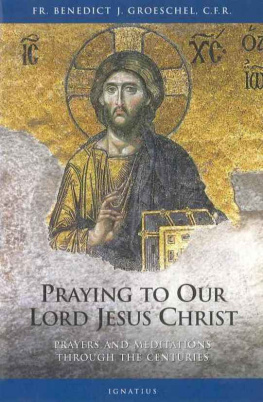Table of Contents
Landmarks
Other Crossway Books by Mark Jones
Faith, Hope, Love: The Christ-Centered Way to Grow in Grace
God Is: A Devotional Guide to the Attributes of God
John 17:2021
I do not ask for these only, but also for those who will believe in me through their word, that they may all be one, just as you, Father, are in me, and I in you, that they also may be in us, so that the world may believe that you have sent me.
Praying for His Bride
An important transition in Christs prayer takes place in John 17:2021, which extends beyond his immediate group of disciples to all believers of every age. We must take care not to overemphasize the distinction between these two groups of followers, even though the latter believe through the preaching of the former. Jesus s petition here gives indication that they are not just the apostles but also the whole church through history. As Paul observes, we are all members of Gods household, built on the foundation of the apostles and prophets, Christ Jesus himself being the cornerstone, in whom the whole structure, being joined together, grows into a holy temple in the Lord (Eph. 2:2021 ).
The church enjoys a unique relationship with Jesus that the world does not. There never was or will be a saint in heaven not included in Christs prayer of John 17:2021. All who believe in him have faith because Christs life, death, resurrection, and intercession make possible Gods gracious gift of supernatural faith (John 1:1213; 3:68; Eph. 2:410). The power to believe comes from Christs intercession, whereby he sends the Spirit to bring light to those in darkness (Acts 2:33; Acts 26:18). Still, everyone coming to Christ must actively believe in him. He does not believe for us but prays for those who certainly will believe (but also for those who will believe in me).
Belief through the Preached Word
Christ informs his disciples that they will bear witness about him. The Spirit, as the Spirit of Christ, bears witness about Christ (John 15:26; Rom. 8:9). The apostles will also bear witness about him because of their unique calling as those present with him from the beginning (John 15:27). Many interpreters focus so much on understanding the oneness expected for the church, they miss the point that faith comes through the preaching of the gospel. We must not miss this point. Hence, Jesus prays that the elect may come to faith through the apostles word, which refers simply to the Word of God in the name of Christ by the power of the Spirit.
Paul, as an apostle of Christ, makes this point clearly in Romans 10:1415:
How then will they call on him in whom they have not believed? And how are they to believe in him of whom they have never heard? And how are they to hear without someone preaching? And how are they to preach unless they are sent? As it is written, How beautiful are the feet of those who preach the good news!
In his opening remarks in Titus, Paul likewise spells out plainly the whole course of salvation in its basic parts:
Paul, a servant of God and an apostle of Jesus Christ, for the sake of the faith of Gods elect and their knowledge of the truth, which accords with godliness, in hope of eternal life, which God, who never lies, promised before the ages began and at the proper time manifested in his word through the preaching with which I have been entrusted by the command of God our Savior. (Titus 1:13 )
What Christ prays in John 17 concerns his servants public (and indiscriminate) preaching of the gospel for the salvation of the elect. What Paul speaks of in Romans 10:1415 and Titus 1:13 truly fulfills Christs prayer.
God appointed the Word as the means to bring people to faith in Christ because it testifies to him. God does not use means unrelated to the ends. The end of our salvation is total conformity to Christ and communion with the triune God, which lead to unending praise and adoration. If, for the sake of argument, God used a dream to bring a Muslim to faith in Christ, that dream would still necessarily be the word of Christ. Ordinarily God uses the preached Word. When he uses some other means, it can never be something divorced from content that speaks of his beloved Son. Moreover, the Holy Spirit, in his work, glorifies Christ. He performs not an act of magic but a work of Christ in someone made alive in order to be remade, through the Word, in the image of Christ.
Oneness
Jesus prays for those who will truly believe in him, through the means of the Word, that they will be united as one. Paul greatly stresses such unity (the absence of division) in the church in many of his letters (see Eph. 34:16). The goal of the visible church is oneness (John 17:11, 2123). Not surprisingly, given the history of the church, verses promoting oneness in John 17 have created significant debate (division?) among theologians from different backgrounds.
We should note that the oneness for which Jesus prays mirrors that between the Father and the Son:
- ... that they may be one, even as we are one (John 17:11).
- that they may all be one, just as you, Father, are in me, and I in you (John 17:21).
- ... that they may be one even as we are one (John 17:22).
- I in them and you in me, that they may become perfectly one (John 17:23).
Why highlight this? Because oneness in the Father and the Son and not unity in the church is the ultimate goal of Christs High Priestly Prayer. Believers are one only in God and Christ.
Jesus knows deeply of his unity with the Father: I and the Father are one (John 10:30). Interestingly, John Calvin, comments on this:
The ancients made a wrong use of this passage to prove that Christ is ( homoousion ) of the same essence with the Father. For Christ does not argue about the unity of substance, but about the agreement which he has with the Father, so that whatever is done by Christ will be confirmed by the power of his Father.
10:31 pick up stones to stone Jesus .
At first glance, it seems most reasonable to argue that the oneness between the Father and Son concerns unity of essence. Yet believers cannot experience this with the divine essence, so this understanding must be dismissed. Instead, we ought to see the oneness between the Father and the Son as an expression of the unity of divine purposes and power in salvation. This qualification becomes necessary because Jesus wants unity in believers as such unity exists in the Godhead. In the accomplishment of Gods work on earth, we must join with him in doing things the way he wants them done, not the way we think is best. Many churches, perhaps even unwittingly, are full of earthly purpose, not heavenly purpose.
Earlier, Jesus said: The Son can do nothing of his own accord, but only what he sees the Father doing. For whatever the Father does, that the Son does likewise (John 5:19). So, in John 10 Calvin and Goodwin see this in terms of the Father and Son carrying out salvation because of the immediate context.
I am the good shepherd. I know my own and my own know me, just as the Father knows me and I know the Father; and I lay down my life for the sheep. And I have other sheep that are not of this fold. I must bring them also, and they will listen to my voice. So there will be one flock, one shepherd. For this reason the Father loves me, because I lay down my life that I may take it up again. (John 10:1417 )
If the Father and the Son are one in purpose and love (For this reason the Father loves meJohn 10:17), believers are to be likewise. The revelation of the Word of God concerning Christ, confirmed by his Spirit dwelling in us, is the means to bring that purpose to fruition. Our union with God and Christ by the Spirit gives us the power to be fruitful, as our Savior was for the kingdom (John 15:47 ).
Unfulfilled Prayer?
















